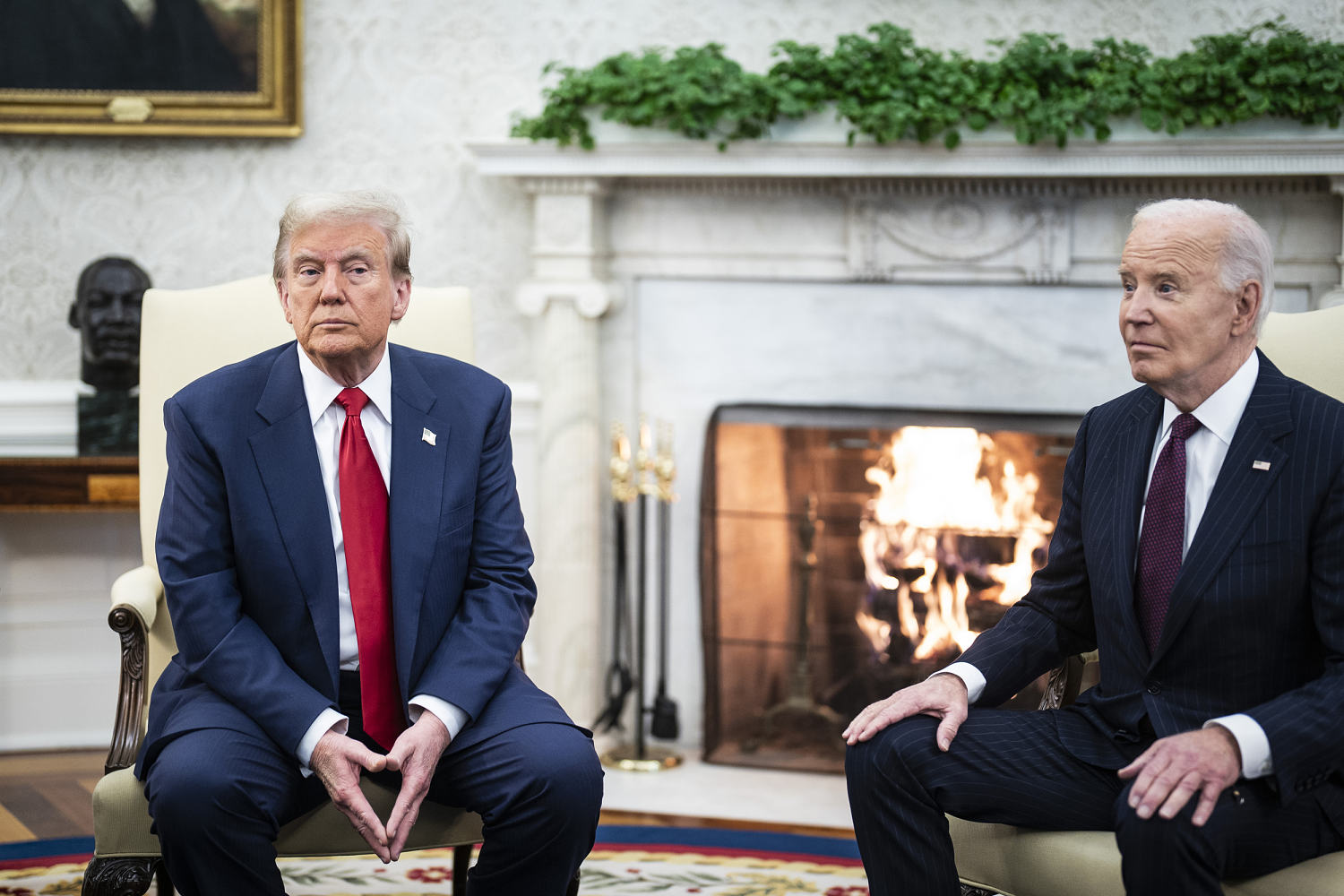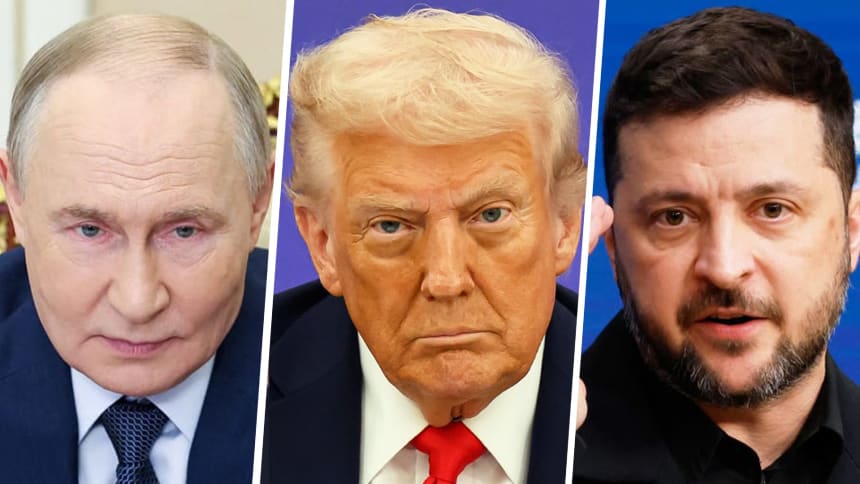The Dictatorship
Biden has one last chance to protect America from Trump’s attempts to skirt the law

We had fair warning. Last month, The New York Times reported that then-candidate Donald Trump’s advisers were telling him to skip FBI background investigations for his high-level selections for nominees. Last week, BLN, citing “people close to the transition planning,” reported that Trump doesn’t plan to submit the names of at least some of his Cabinet-level picks for FBI vetting. Whether you’re Republican, Democrat or independent, and regardless of whether you’re energized or enraged by Trump’s controversial picksyou should be concerned about the possibility of a vetting process that’s really no process at all.
Whether you’re energized or enraged by Trump’s picks, you should be concerned about the possibility of a vetting process that’s really no process at all.
The FBI has conducted background investigations of White House nominees since at least the tenure of President Dwight Eisenhower’s time in office. Even so, there’s no law clearly mandating presidents or presidents-elect to submit their nominees and appointments to the FBI for investigation. In 1953, Eisenhower issued Executive Order (EO) 10450calling for investigations of prospective federal employees. Yet, executive orders don’t have the full effect of a law and are only binding on the executive branch. Worse, Eisenhower’s executive order is subject to interpretation. Consider Section 2, “The head of each department and agency of the Government shall be responsible for establishing and maintaining within his department or agency an effective program to ensure that the employment and retention in employment of any civilian officer or employee within the department or agency is clearly consistent with the interests of the national security.” There’s lots of wiggle room there.Section 3 of that executive order reads, “The appointment of each civilian officer or employee in any department or agency of the Government shall be made subject to investigation … but in no event shall the investigation include less than a national agency check (including a check of the fingerprint files of the Federal Bureau of Investigation).” That means that Trump, who claims he’s using private firms to conduct background inquiries, might get by with having whatever firm that is simply checking FBI fingerprint files. Yet, despite there being no mandate, the intent here was a government inquiry involving the FBI.
Subsequent presidents, including Bill Clinton and Barack Obamarevised Eisenhower’s edict to mitigate intrusive inquiries into sexual orientation in the granting of security clearances, but still missing is a specific mandate for FBI investigation of White House nominees. And again, an executive order isn’t quite a law. Clearly, the intent in these executive orders has always been for a government agency, particularly the FBI, to conduct these inquiries, but we have an incoming president who thumbs his nose at rules and intentions.The Presidential Transition Act of 1963 directs the FBI to conduct such background checks “expeditiously” for “individuals that the President-elect has identified for high level national security positions.” But what if he never formally identifies and submits his picks to the Department of Justice and the FBI? In his last administrationTrump overrode security adjudicators who denied clearances for his son-in-law, Jared Kushnerand many others, after FBI background checks resulted in national security concerns. This time, he appears poised to dispense with the FBI checks and potentially with the Senate confirmation process by making recess appointments.
That leaves us with two pertinent memorandums of understanding (MOU) which should enable President Joe Biden and/or the U.S. Senate Judiciary Committee to quickly do something to preserve national security and the Constitution’s advice, and consent powers conferred on our elected lawmakers.
This time, he appears poised to dispense with the FBI checks and potentially with the Senate confirmation process by making recess appointments.
First, Biden should rely upon the existing MOU between the Department of Justice and his office, as well as the Presidential Transition Act, to investigate the people Trump says he wants to put in office. The MOU sets out procedures for requesting background investigations of nominees “at the request of the president.” It doesn’t say the president-elect, it says “president.” That’s you, Joe. As for the transition act, it reads as applying to people “…the President-elect has identified” for high-level positions. Well, the president-elect has already publicly identified those people. And Biden should respond.What happens if a nominee refuses to cooperate, won’t provide his consent to be investigated or won’t fill out any forms? The MOU has a remedy for that: “The DOJ and FBI may consider a request from the President for a name check or BI without the consent of the appointee if justified by extraordinary circumstances.” I’d say with some of these nominees named by Trump, and the fact that Trump may forego FBI vetting of them, we have extraordinary circumstances.
The Senate Judiciary Committee has its own pertinent MOU with the Counsel to the President. That document says the committee “shall have access to” the FBI reports on nominees for attorney general, FBI director or summaries for “all other DOJ nominees and non-judicial nominees.” Emphasis on all other and non-judicial. We know senators want the details of the House Ethics Committee inquiry into former Rep. Matt Gaetz, Trump’s pick for attorney general. An FBI background investigation would certainly include a request to review that report, as well as the DOJ criminal investigation, now closed, into Gaetz. The Senate Judiciary Committee should make a bipartisan request for an FBI background check of Trump’s picks now. Regardless of party affiliation, if senators relinquish their advice and consent authority or confirm a nominee without benefit of knowing the risk they pose, then they set a precedent for never again exercising their constitutional powers.
You’d be right to ask, “What’s the point?” After all, Trump is unlikely to read, let alone act upon, any derogatory information developed in FBI reports. The point would be to force Trump’s hand. Drop the reports on his desk and let him go forward with nominees who potentially are either found through investigation to be unqualified, at risk of compromise, or even a national security threat. Let Trump order White House security clearance adjudicators or his hand-picked agency heads to grant security clearances to seemingly unqualified candidates. Let the Senate affirm nominees after they’ve read details about the kind of people who may lead the DOJ or serve as the director of national intelligence.
Don’t take it from me. Here’s what Founding Father Alexander Hamilton said about the Senate’s advice and consent role, and the need for checks and balances against a president’s nominees. “…the president would be ‘ashamed and afraid’ to bring forward unmeritorious candidates, whose only qualifications would be [hailing] from particular states, or being personally allied to the president, or ‘possessing the necessary insignificance and pliancy to render them the obsequious instruments of his pleasure.’”
Biden should be neither ashamed nor afraid to thoroughly investigate Trump’s picks, given the signs that Trump may not. Through executive order, he should mandate that the FBI conduct background investigations on Trump’s picks and instruct the FBI to begin the process now. The U.S. Senate should use its power to request the same of the FBI.
The clock is ticking.
Frank Figliuzzi is an BLN columnist and Senior National Security and Intelligence Analyst for NBC News and BLN. He was the assistant director for counterintelligence at the FBI, where he served 25 years as a special agent and directed all espionage investigations across the government. He is the author of “The FBI Way: Inside the Bureau’s Code of Excellence.”
The Dictatorship
Trump’s border czar says ‘small’ security force will remain in Minnesota after enforcement drawdown

WASHINGTON (AP) — White House border czar Tom Homan said Sunday that more than 1,000 immigration agents have left Minnesota’s Twin Cities area and hundreds more will depart in the days ahead as part of the Trump administration’s drawdown of its immigration enforcement surge.
A “small” security force will stay for a short period to protect remaining immigration agents and will respond “when our agents are out and they get surrounded by agitators and things got out of control,” Homan told CBS’ “Face the Nation.” He did not define “small.”
He also said agents will keep investigating fraud allegations as well as the anti-immigration enforcement protest that disrupted a service at a church service.
“We already removed well over 1,000 people, and as of Monday, Tuesday, we’ll remove several hundred more,” Homan said. “We’ll get back to the original footprint.”
Thousands of officers were sent to the Minneapolis and St. Paul area for U.S. Immigration and Customs Enforcement’s “Operation Metro Surge.” The Department of Homeland Security said it was its largest immigration enforcement operation ever and proved successful. But the crackdown came under increasing criticism as the situation grew more volatile and two U.S. citizens were killed.

People take part in an anti-ICE protest outside the Governors Residence in St. Paul, Minn., on Friday, Feb. 6, 2026. (AP Photo/Ryan Murphy)
People take part in an anti-ICE protest outside the Governors Residence in St. Paul, Minn., on Friday, Feb. 6, 2026. (AP Photo/Ryan Murphy)
Protests became common. A network of residents worked to help immigrants, warn of approaching agents or film immigration officers’ actions. The shooting deaths of Renee Good and Alex Pretti by federal officers drew condemnation and raised questions over officers’ conduct, prompting changes to the operation.
Homan announced last week that 700 federal officers would leave Minnesota immediately, but that still left more than 2,000 in the state. He said Thursday that a “significant drawdown” was already underway and would continue through this week.
Homan said enforcement would not stop in the Twin Cities and that mass deportations will continue across the country. Officers leaving Minnesota will report back to their stations or be assigned elsewhere.
When asked if future deployments could match the scale of the Twin Cities operation, Homan said “it depends on the situation.”
The Dictatorship
Rubio says ‘no reason’ to doubt Navalny was killed by dart frog poison
ByDavid Rohde
Secretary of State Marco Rubio says there is “no reason” to doubt a new report by five European nations that Russian opposition leader Alexei Navalny was killed in a Russian government prison with poison found in Latin American dart frogs.
A fatal toxin not found naturally in Russia — epibatidine — was “conclusively” discovered in samples of Navalny’s body by a joint investigation conducted by Germany, France, Britain, the Netherlands and Sweden, according to a joint statement by the nations on Saturday.
The toxin is only known to exist in poison dart frogs in Central and South America. One species, the phantasmal poison frog, contains a chemical that is 200 times more potent than morphine.
“It’s a troubling report,” Rubio told reporters at a news conference during a visit to Slovakia on Sunday. “We don’t have any reason to question it.”

It was not clear why the United States did not participate in the investigation of Navalny’s death. But the finding comes amid rising support in the Senate for a bill that would impose sweeping new sanctions against the government of Vladimir Putin, which has been opposed by the Trump administration.
Sen. Jeanne Shaheen, D-N.H., the top Democrat on the Senate Foreign Relations Committee, noted on the closing day of the Munich Security Conference, where Rubio received a standing ovationthat 84 out of 100 senators have signed on to co-sponsor the bill authored by Sen. Lindsey Graham, R-S.C.
“I don’t understand the reluctance to go after Vladimir Putin and what Russia is doing in Ukraine,” Shaheen told a group of reporters. “The failure by the United States to act has extended this war.”
Russian officials have repeatedly denied playing any role in the death of Navalny two years ago in a government-run penal colony in the Arctic. They called the new European report “a Western propaganda hoax,” according to Russia’s state news agency.

The report comes as U.S. envoy Steve Witkoff and Jared Kusher, President Donald Trump’s son-in-law, are expected to meet with both Russian and Iranian officials on Tuesday in Geneva. The goal of the Russia talks is to reach a peace settlement in Ukraine by a June deadline the administration has set. (Witkoff and Kushner are also set to join a second round of nuclear talks with Iranian officials in Geneva on the same day.)
Critics of Trump, who promised to end the war days after returning to office, say Russia has not been seriously negotiating and is simply playing for time so it can gain ground on the battlefield. Democrats have also expressed concerns over reports that Witkoff has been negotiating business deals during peace talks with Kirill Dmitriev, a former Wall Street banker who runs Russia’s sovereign wealth fund.
Last week, Ukrainian President Volodymyr Zelenskyy said that Dmitriev pitched $12 trillion in bilateral economic agreements with the U.S. It is unclear how such large deals could be achieved. The $12 trillion figure is about four times the size of Russia’s 2025 gross domestic product.
A European diplomat whose country has negotiated with Russia in the past told MS NOW that Moscow has repeatedly made such investment offers. But the business entities end up being largely Russian controlled. “They lure you in,” said the diplomat, who was granted anonymity to speak candidly.
Shaheen expressed skepticism as well.
“I’m concerned about all things Russian in this administration,” Shaheen said. “I’m not a conspiracy theorist. But I’m beginning to become one with respect to Putin and President Trump.”

David Rohde
David Rohde is the senior national security reporter for MS NOW. Previously he was the senior executive editor for national security and law for NBC News.
The Dictatorship
FBI links glove found near Nancy Guthrie’s home to suspect on video
A glove with DNA found near 84-year-old missing Nancy Guthrie’s home appears to match those worn by a masked person caught on surveillance footage, the FBI said Sunday.
“The FBI received preliminary results yesterday on 2/14 and are awaiting further testing,” the bureau said in a statement. “This process typically takes 24 hours from when the FBI receives DNA.”
The FBI said investigators collected “approximately 16 gloves in various areas near” Guthrie’s house in Tucson, Arizonawhere she was last seen on Jan. 31. Most of those gloves were “searchers’s gloves that they discarded in various areas when they searched the vicinity” but the glove with the “DNA profile recovered is different and appears to match the gloves of the subject in the surveillance video,” the FBI said.
“What we have is a lead here. The glove retrieved would need to have the victim’s DNA or some other forensic material to tie it to the home,” a law-enforcement source familiar with the investigation cautioned. “It must be connected to the home and victim. That would make the glove actual evidence, at this point it’s a lead. A good lead.”

The FBI said said the glove was found in a field approximately two miles from Guthrie’s house. The glove resembles the one on the hand of a person who was captured on porch camera video footage at the home of NBC “Today Show” host Savannah Guthrie’s mother the night she went missing.
The agency said it is awaiting quality control and official confirmation before putting the individual’s profile into the bureau’s national database, which could take up to 24 hours.
The FBI has described the man captured in photographs and on video as approximately 5’9”-5’10” with an average build. In addition to gloves, he was also seen wearing a ski mask and a black, 25-liter “Ozark Trail Hiker Pack” backpack. The agency on Thursday increased its reward for any information leading to an arrest and conviction of anyone involved in Guthrie’s disappearance to $100,000.
Guthrie was reported missing by her family on Feb. 1. Sheriff’s deputies also found blood on the front porch that was later confirmed to belong to the network host’s mother. Guthrie’s children, including Savannah, have posted several videos pleading for their mother’s release, agreeing to pay any ransom demanded and asking for help from the public.
Alex Tabet, Marc Santia and Ken Dilanian contributed to this report.
Erum Salam is a breaking news reporter and producer for MS NOW. She previously was a breaking news reporter for The Guardian.
-

 The Dictatorship1 year ago
The Dictatorship1 year agoLuigi Mangione acknowledges public support in first official statement since arrest
-

 Politics12 months ago
Politics12 months agoFormer ‘Squad’ members launching ‘Bowman and Bush’ YouTube show
-

 The Dictatorship5 months ago
The Dictatorship5 months agoMike Johnson sums up the GOP’s arrogant position on military occupation with two words
-

 Politics12 months ago
Politics12 months agoBlue Light News’s Editorial Director Ryan Hutchins speaks at Blue Light News’s 2025 Governors Summit
-

 Politics12 months ago
Politics12 months agoFormer Kentucky AG Daniel Cameron launches Senate bid
-

 The Dictatorship12 months ago
The Dictatorship12 months agoPete Hegseth’s tenure at the Pentagon goes from bad to worse
-
Uncategorized1 year ago
Bob Good to step down as Freedom Caucus chair this week
-

 Politics10 months ago
Politics10 months agoDemocrat challenging Joni Ernst: I want to ‘tear down’ party, ‘build it back up’








